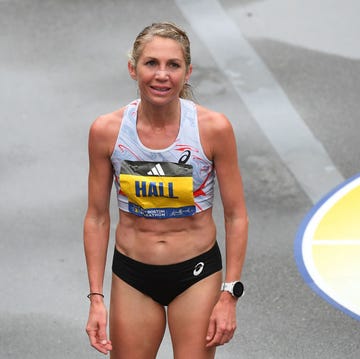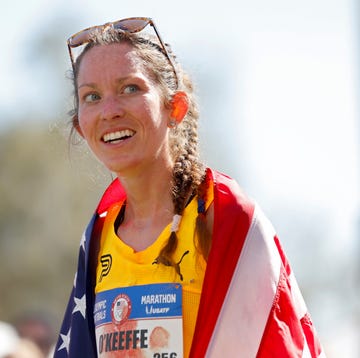For the second time in Olympic history, Saudi Arabia is sending female athletes to the games in Rio, including two runners, according to the Saudi Olympic Committee.
Saudi-American Sarah Attar is running the marathon, and Cariman Abu al-Jadail is competing in the 100 meters. The two runners are joined by judo athlete Wujud Fahmi and fencing competitor Lubna al-Omair.
The four women’s participation—double the number from 2012—suggests an opening for women sports in the conservative Islamic nation. Along with the delegation announcement, Saudi officials announced that Princess Reema bint Bandar Al-Saud will lead a new women’s division at the General Sports Authority, the country’s national sports federation.
The princess’s job will be to help the country catch up to the rest of the world in regard to women’s sports, said Yaser Alamoodi, a spokesperson for the Saudi Olympic Committee.
Track athlete Cariman Abu al-Jadail wasn’t available for an interview, but Newswire caught up with Attar, who became the first female Saudi Arabian Olympic runner when she ran the 800 meters in 2012. This year, she’s returning as a marathoner and a veteran Olympian with a stronger understanding of the importance of her participation.
“In London I felt so proud to be in an event where all of the countries of the world came together and I’m definitely looking forward to this year,” said Attar.
Attar was a 19-year-old college student and a walk-on track athlete at Pepperdine University in 2012 when Saudi Arabia agreed to allow women to compete in London. Because there were no organized women’s sports programs in the nation, the government cast a wide net in search of women who could represent the country. Attar was born and raised in Southern California to an American mom and a Saudi father. She has dual citizenship and her name, she said, somehow got on a list of potential athletes.
Her first reaction was to think she wasn’t fast enough. “I remember telling my mom that I hadn’t hit any of the time standards,” Attar said. But she immediately understood the symbolic importance of being one of the first women to represent Saudi Arabia. (The other female athlete was judo competitor Wojdan Shaherkhani.)
Attar ran the 800 meters with a wild-card entry, which enables some athletes to compete without the qualifying standard in order to further participation. “The 800 was a good option because I wouldn’t be out there getting lapped in the 5,000 or something,” she said. “And it got me in the stadium, which was good exposure for this big moment in history.”
She competed fully covered—wearing full-length leggings, a long-sleeved shirt, and a head scarf—and finished last in her heat, barely registering that the crowd's standing ovation was for her. Back in Riyadh, the capital city of Saudi Arabia, an artist commemorated her race with a street poster.
While Attar was aware her participation had a positive effect, she didn't grasp it's full impact until she spoke at a Saudi girls' school.
“Two of my young cousins attended this school and my name was part of a P.E. homework assignment,” Attar said. “The assignment included a question that was something like, 'If you were Sarah Attar, what would you choose for a healthy lunch?' My cousins were like, oh, Sarah’s my cousin. The teacher didn’t believe them, so the next time I was in town, they invited me to speak.”
Attar felt like a celebrity. All the girls wanted to have their picture taken with her and get her autograph. At one point, she asked the 400 girls in the auditorium who wanted to compete in the Olympic Games. Every girl’s hand shot up.
“That was impactful because I realized what I had done,” Attar said. “For the first time, Saudi girls saw that sports was a possibility for them. They could grow up to be an athlete. I’ve reflected on that and it’s powerful.”
If 2012 was big global step for women’s sports—Qatar and Brunei also sent female athletes to the Olympics for the first time—2016 is the essential follow-up. “It’s important for girls to keep seeing women athletes who look like them,” Attar said. “It’s special to me that I get to be someone who allows that.”
Attar will compete in Rio fully covered, as she did in 2012. “In the West, people tend to see covering as oppressive, but in the Kingdom, it’s very much like us putting on a jacket,” she said. “Many women take pride in it and it aligns with their religious values.”
Her hope is that women will see that wearing an abaya, the Saudi robe women are required to wear in public, or other covering does not limit their athletic ability. “If you cover and want to run, go for it,” she said.
Attar said that while running is just emerging for both men and women in Saudi Arabia (walking is more popular) on a recent visit it was fun to see women out walking with bright-colored running shoes peeking out from under their abaya.
Attar’s exact outfit is yet to be determined. She and her apparel sponsor Oiselle are toying with options that will work for the longer distance in hot conditions.
The question of heat, however, hasn’t been a big one for Attar. “It’s a concern, obviously, because I’ll be covered and we’re preparing for that,” she said. “But the bigger focus has been on ensuring the fitness is there.”
In 2012, Attar learned she’d be going to the Olympics two months before the Games. She had recently run her first marathon—Big Sur, in 3:30. And while she worked with Joaquim Cruz, the 800-meter gold medalist in 1984, she competed in the 800 with more marathon endurance than track speed.
This time, she’s known since the start of the year that she could be racing the marathon in Rio and has trained accordingly, if cautiously. In 2015, Attar moved to Mammoth Lakes, California, in order to focus on running full-time. She now trains in the high peaks under the under the guidance of Andrew Kastor, head coach of the Mammoth Track Club, and alongside other elites, including Olympian and American marathon record-holder Deena Kastor.
Coach Kastor has intentionally kept Attar's mileage low to minimize her injury risk. “I hit 86 miles before leaving for Rio, my max,” she said. “My participation means more to me than my time and we didn’t want to hinder that opportunity by pushing bigger weeks.”
Attar has a marathon PR of 3:11, 26 minutes shy of the 2:45 qualifying standard. As she did in 2012, she’s running under the wild-card clause. She's under no illusion she’ll set a personal best in Rio. She’s aiming only for her best day possible under the conditions. But she’s already thinking about heading to the 2020 Tokyo Games with the 2:45 standard. “I’m excited to see what I can do with more mileage,” she said.
But attending the Games as a wild-card athlete now feels appropriate and poignant to Attar. “I feel my story speaks to the value of the Olympic creed of the importance of participation over winning, of global connectivity,” she said. “I feel part of Saudi and it’s part of me. It’s like growing up here in the States allowed me to represent Saudi and the growth of women’s sport. It brought me to this moment.”
Watch Next

Advertisement - Continue Reading Below

Parker Valby Wins the Bowerman

Chappell Roan: “I Love Running. But Not Anymore.”

All About 75 Hard?

Are Average Runners Getting Faster? It Depends
Advertisement - Continue Reading Below
Advertisement - Continue Reading Below









